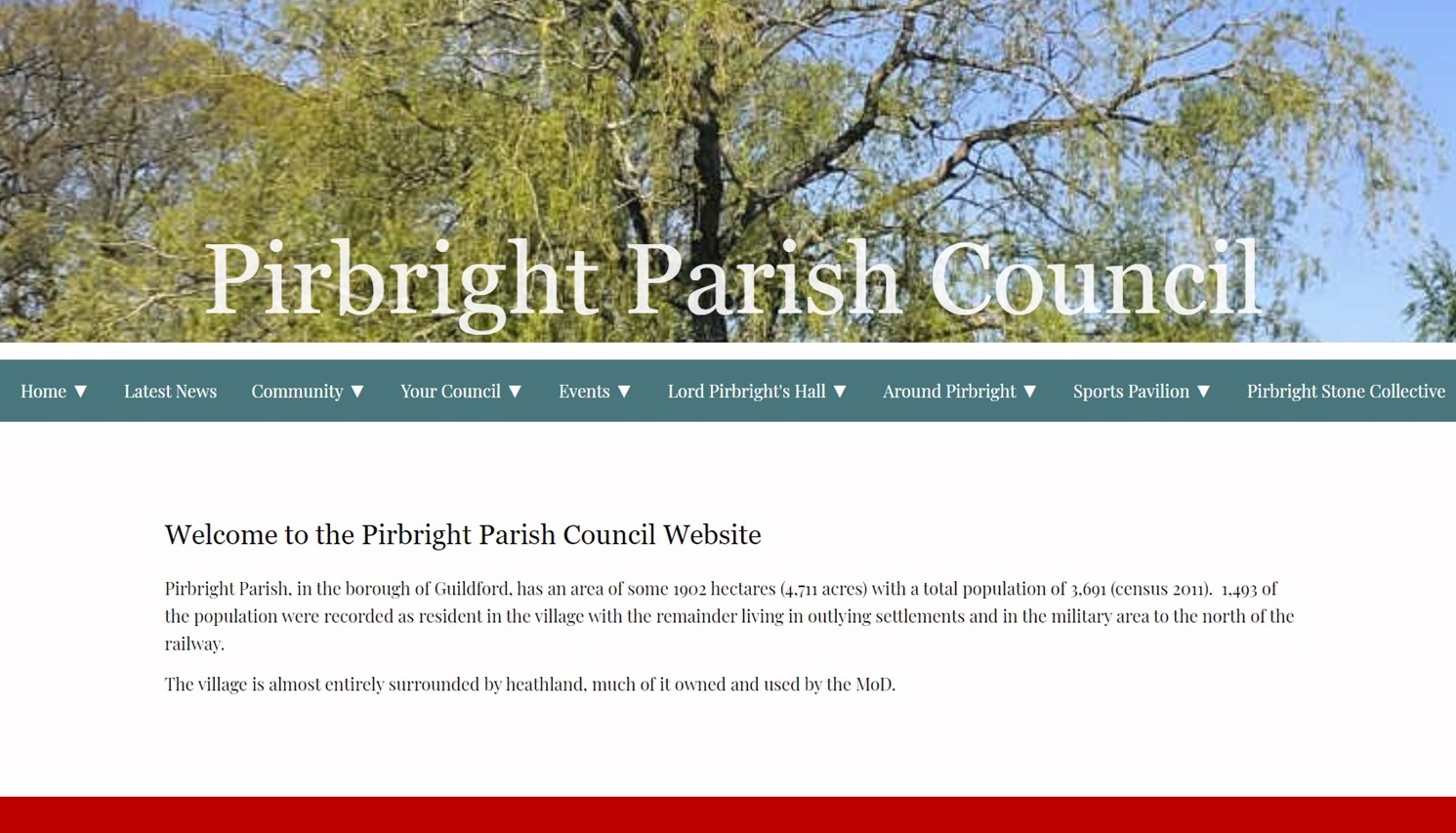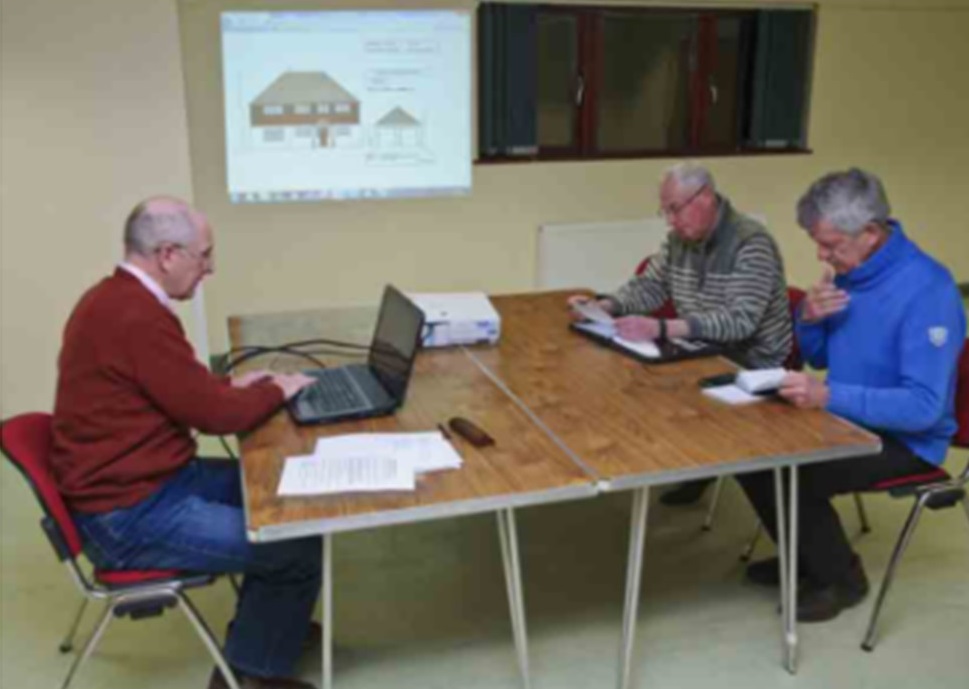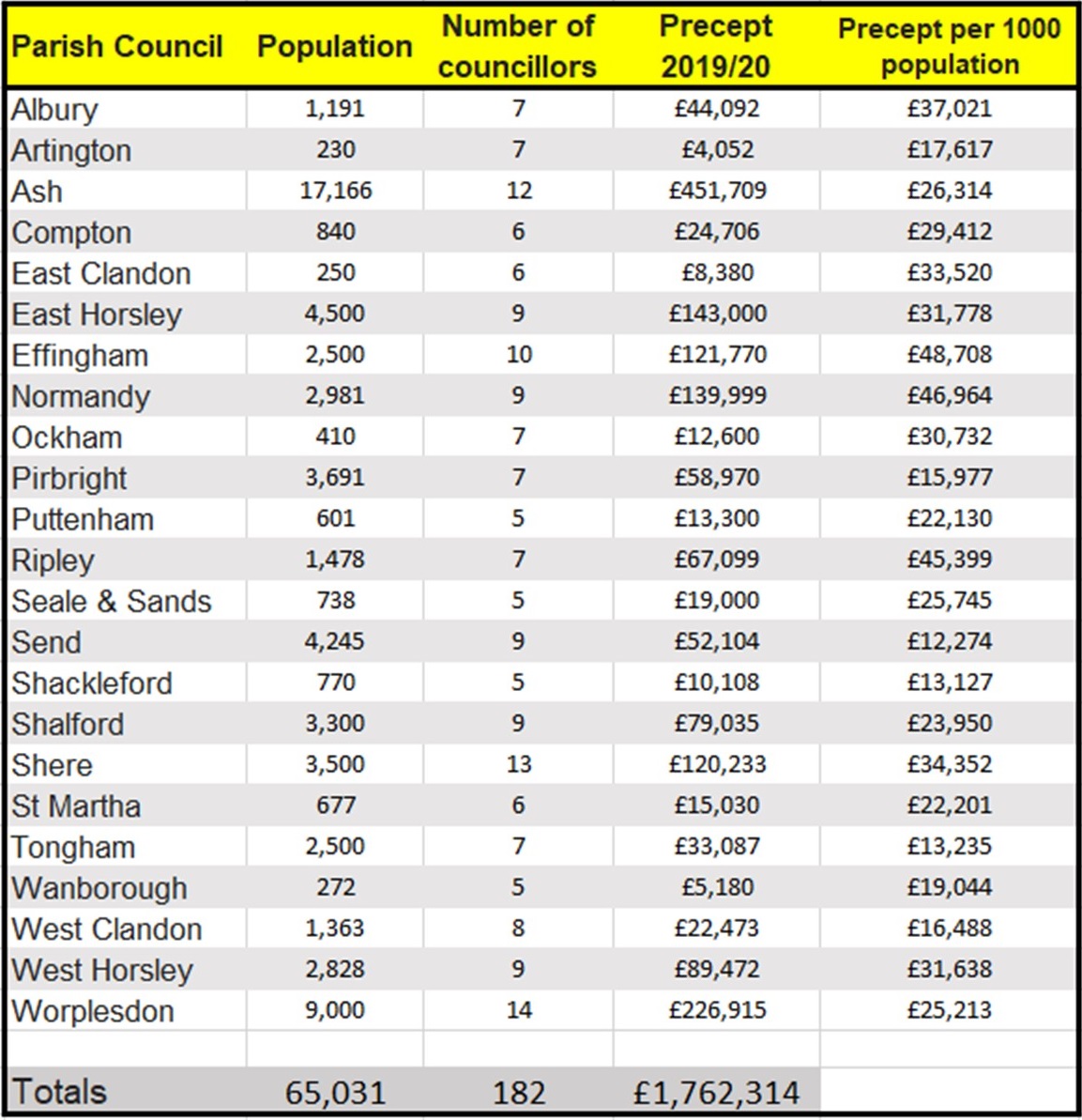 Abraham Lincoln
If given the truth, the people can be depended upon to meet any national crisis...
Abraham Lincoln
If given the truth, the people can be depended upon to meet any national crisis...
 Guildford news...
for Guildford people, brought to you by Guildford reporters - Guildford's own news service
Guildford news...
for Guildford people, brought to you by Guildford reporters - Guildford's own news service
Most Of Us Don’t Have A Clue About Parish Councils
Published on: 4 Mar, 2021
Updated on: 6 Mar, 2021
By Hugh Coakley
Answer these questions:
- Do you have a parish council?
- Where and when do they normally meet?
- What do they do?
- Can you name any of your parish councillors?
If you can answer two or more, you probably are a parish councillor. Most of us don’t have a clue. We are more likely to know our regional MP than those representing us in our closest tier of government.

Map showing the 23 parish councils in Guildford borough (Wisley is not listed as a Guildford parish on the GBC website).
Only those of us living in the “town wards” of Guildford borough don’t have a parish council, but about two-thirds of us do. Some towns, such as Farnham, have a town council, roughly equivalent to a parish council but despite some supporters, Guildford has resisted any move to create one.
Defining what parish councils do exactly is difficult because the 23 parishes around Guildford differ in size and function. The Dragon sent a survey to all the parish councils to try to understand them a bit better.

Pirbright PC website. All the parish councils have their own website which has useful information for the residents.
They range from the tiny, Artington, East Clandon or Wanborough, with populations between two and three hundred and incomes of less than £10,000 per year, to Ash which covers four wards and has an annual income of about £750,000 and responsibilities to match.
Ash PC has a staff of 11, provides five playgrounds, sports facilities and four recreation grounds, and is responsible for the parish street lighting, four free car parks, allotments, bus shelters and the cemetery as well as several other functions.
Artington’s website lists only a few responsibilities. With only a part-time parish clerk, their activities include responding to planning applications and looking after village “environment matters such as the maintenance of the Amenity Triangle and grass-cutting”.
One function common to all parish councils is representing residents on planning issues, sometimes as a statutory consultee. Most have a regular planning committee meeting. Compton listed one of their tasks as “challenging the Local Plan, with particular reference to the proposed development at Blackwell Farm”.
Effingham said they had commented on 95 planning applications recently, including “some highly complex proposals from large developers such as Berkeley Homes” (see Plan for 17 homes on sensitive site in Effingham rejected), West Horsley had a Neighbourhood Plan adopted in 2018.
Some parishes had lofty ambitions. East Horsley and East Clandon were working to deliver ultrafast broadband to their areas. East Horsley said they had “the largest parish council community broadband project in the country”. Their parish clerk, Nick Clemens, said councillors and volunteers were committed to the project, “a fantastic success”.
Others eyed more modest but nonetheless valuable goals, Pirbright working to provide a sports pavilion for the cricket club and Tongham and Seale and Sands providing outdoor gym equipment on their recreation grounds.
The disparity between what different councils do is simple: by law, parish councils have few obligations, unlike their big brothers, the boroughs, and their powers are discretionary. They can choose to run the allotments or clean bus shelters or have a village hall or even coordinate ultrafast broadband for their area. But they don’t have to.
As one parish clerk told me: “We have fewer duties but more powers that the principal authorities.”
But parish councils have had a poor Press recently. We saw Jackie Weaver taming badly-behaved councillors at Handforth and, closer to home, our own Normandy PC imploding after a critical audit and an ill-tempered meeting in January.
Those are hardly representative. Around our borough, there nearly 200 unpaid parish councillors, with minimal paid staffing and helped by many volunteers, giving up their time and skills to work for their immediate community.
They are an important link with the borough and the county, most council meetings being attended by higher-tier representatives, and they know their local area intimately.
Unlike the borough, their powers to tax residents, called a precept, is not capped.
The precept is collected by the borough and amounted to about £1.8 million in 2019/20. More than £600,000 in additional income came through grants and other sources.
Some parishes told The Dragon that boroughs, squeezed for cash, are considering transferring some of their non-mandatory functions to them. Extra duties could be absorbed but higher precepts are likely.
The parishes are wary, especially if unitary authorities displace the boroughs and areas such as planning, where the parishes do not have the professional expertise, are devolved.
All of the 16 councils that responded to the survey said they were not political. This is contrary to the national picture where about half of parish councils are run on party lines.
West Horsley PC said they were: “apolitical and intend to remain so”. Ash PC, which did not respond to The Dragon survey due to illness, had previously said they were “a political council”.
The uncomfortable truth is that most people know little if anything about their parish council (see Comment: We must know what went wrong with this parish council).
Most councillors are elected unopposed. Only four of the councils said they had had any Press reporting their meetings in the past five to 10 years or so and that was in The Dragon.
In general, parish councils are keen to let residents know more about what they do. The Dragon is planning a series of articles on the individual councils starting in April this year. We will feature their work and their impact and influence on the communities they serve.
Responses to Most Of Us Don’t Have A Clue About Parish Councils
Leave a Comment Cancel replyPlease see our comments policy. All comments are moderated and may take time to appear. Full names, or at least initial and surname, must be given.
Recent Articles
- School Head Says There Should Be VAT Exemptions for SEN Kids
- SCC Leader Seeking Postponement of County Council Elections to Focus on Devolution
- Letter: Banning Cousin Marriages Would Be Wrong
- Column: Guildford’s MP Writes – Greener, Fairer, Thriving
- Deepcut To Become the First New Parish in Surrey This Century
- Notice: Run for Charity
- Letter: Happy New Year
- Mole Valley Best Place to Live in the South East
- ‘Truly Inspiring’ Musical Event Brings Generations Together
- Guildford to Gatwick Line to Close for Two Weeks to Allow Critical Upgrades


Recent Comments
- Ricky Sonn on Column: Guildford’s MP Writes – Greener, Fairer, Thriving
- Stephen Spark on Column: Guildford’s MP Writes – Greener, Fairer, Thriving
- David Wheeler on Football Pitches Approved as Part of Secretts Redevelopment
- Ben Paton on Letter: A Surge of Discontent Calls for Accountability and Change
- Barbara Ford on Letter: A Surge of Discontent Calls for Accountability and Change
- John Ferns on Letter: A Surge of Discontent Calls for Accountability and Change
Search in Site
Media Gallery
Dragon Interview: Local Artist Leaves Her Mark At One of England’s Most Historic Buildings
January 21, 2023 / No Comment / Read MoreDragon Interview: Lib Dem Planning Chair: ‘Current Policy Doesn’t Work for Local People’
January 19, 2023 / No Comment / Read MoreA3 Tunnel in Guildford ‘Necessary’ for New Homes, Says Guildford’s MP
January 10, 2023 / No Comment / Read More‘Madness’ for London Road Scheme to Go Ahead Against ‘Huge Opposition’, Says SCC Leader
January 6, 2023 / No Comment / Read MoreCouncillor’s Son Starts Campaign for More Consultation on North Street Plan
December 30, 2022 / No Comment / Read MoreCounty Council Climbs Down Over London Road Works – Further ‘Engagement’ Period Announced
December 14, 2022 / No Comment / Read MoreDragon Interview: GBC Reaction to the Government’s Expected Decision to Relax Housing Targets
December 7, 2022 / No Comment / Read MoreHow Can Our Town Centre Businesses Recover? Watch the Shop Front Debate
May 18, 2020 / No Comment / Read More












Martin Elliott
March 4, 2021 at 7:54 pm
Useful education on Local Authorities, especially with talk of Unitary Authority.
Perhaps Hugh Coakley could follow up with a fact-based article on the SCC-GBC Guildford Joint Committee.
Their constitution seems to give them a lot of delegated power on decisions and spending on issues for both councils ie prioritising road repairs. But can it and does it achieve this efficiently with only four meetings a year? Who monitors this at SCC and GBC?
Who manages their administrative staff and monitors their extensive presence on social media. Why are meetings publicised, but without a link to agenda?
Perhaps we should see the Guildford Joint Committee as being an actual, but limited, “Unitary Authority”.